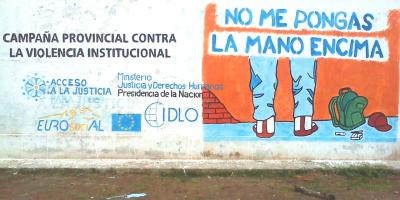
In a recent interview with Spanish daily El País, star footballer Carlos Tévez confessed that, as a child growing up on the streets of the ominously-named Fuerte Apache estate just outside Buenos Aires, his biggest fear was to be detained by police.
Not that he’d done anything wrong. Across Argentina, kids pacing the labyrinthine hallways of derelict housing projects, kicking a ball on a dirt street in low-rise shanty towns, or smoking outside local corner shops know that being stopped, searched and possibly arrested by a passing patrol is a very likely scenario.
More often than not, there is no real reason for this. The commonly used phrase is portación de rostro, or ‘wearing a face’– their appearance is what makes them suspicious. Wearing a tracksuit or a baseball cap is an aggravating circumstance. One minute you are chatting to your friends, the next you are facing a wall, your possessions scattered on the pavement, hands frisking you for weapons or drugs.
More often than not, passers-by look the other way, or mutter under their breath that they ‘surely deserve it’.
More often than not, the kids being searched and arrested have no idea what their rights are – or even that they have any.
Wearing a tracksuit – or simply the wrong 'face' – may make you liable for arrest.
The issue is so raw that when IDLO held a workshop in the northern province of Santiago del Estero to train youth in creating their own rights-awareness campaigns, there was hardly any debate: ‘institutional violence’ – and in particular the ill-treatment of young people at the hands of the police – would be at the heart of their actions.
The training took place in June 2014 in collaboration with the Argentinian Ministry of Justice, in the framework of the EU’s EUROsociAL II Program, and was attended by a group of 16 young people working for the local Access to Justice Center.
"When I was 16, I was detained by police as I was walking home from a party," said Manuel, an aspiring communications student. "My parents didn’t know where I was for two days.” Two years later, as he was arrested again in the street, he found there was no record of his previous detention.
'Never the same again'
There were plenty of similar stories. “A neighbor’s son was coming home from dancing in the early hours of the morning. He was taken to the police station. Nobody knows exactly what happened there, but he was never the same again,” a girl said.
Brainstorming at the workshop produced a slogan for the campaign – ‘Hands off! Your violence = my insecurity’ – and resulted in a course of action to promote awareness of the rights and procedures that security forces must respect while carrying out searches or detentions.
With the help of the local ombudsman’s office, participants created information materials , to be distributed at a series of events in some of the city’s most vulnerable neighborhoods.
“We chose to hold the events in the areas where the incidence of youth detentions in the street is particularly high,” explains Paola Mansilla, a lawyer working at the Access to Justice Center.
The events debuted in late February. They include the collective painting of a mural bearing the campaign slogan, a street theater performance, and the launch of an open-mic radio show.

